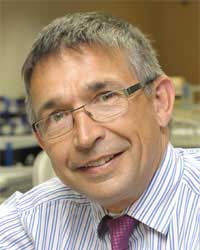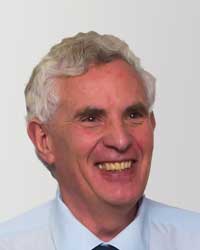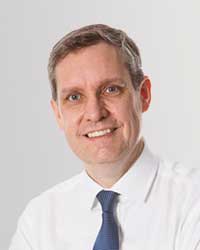Dr John Sandham
 John is a chartered engineer who has been working in the healthcare technology field for over 30 years. He is a recognised expert in his field of healthcare technology management. He has been instrumental in changing the device management processes of many NHS Trusts and has a proven track record in delivering safe recurrent cost saving improvements that also improve regulatory compliance.
John is a chartered engineer who has been working in the healthcare technology field for over 30 years. He is a recognised expert in his field of healthcare technology management. He has been instrumental in changing the device management processes of many NHS Trusts and has a proven track record in delivering safe recurrent cost saving improvements that also improve regulatory compliance.
His knowledge of medical devices includes general biomedical, X-ray and pathology. John has been chairman of EBME (www.ebme.co.uk) since 1999. He has spoken on radio and appeared on television representing the medical engineering viewpoint and acting as an expert in his field. John has had over 150 educational articles published.
He has been published in the Open University Science review, Engineering Technology Journal (IET), plus various other newspapers, procurement and scientific publications and the EBME website www.ebme.co.uk. John is a fellow of the Institute of Work Based Learning, and a visiting Senior Research Fellow at Middlesex University. He is keen to share his knowledge and raise the profile of Medical Engineering.
Mike Hilditch
 Mike Hilditch has been an auctioneer for 37 years, starting as a livestock auctioneer in Warwickshire before moving to antiques and, over the last 28 years, plant, machinery and medical equipment.
Mike Hilditch has been an auctioneer for 37 years, starting as a livestock auctioneer in Warwickshire before moving to antiques and, over the last 28 years, plant, machinery and medical equipment.
Mike worked for a number of companies as a freelance auctioneer before establishing the Hilditch Group over 25 years ago. Mike Hilditch founded the Hilditch Group with his wife, Nicky.
The company sells medical equipment on behalf of the NHS amongst others. Mike & Nicky firmly believe they have a social, as well as corporate, responsibility. It became apparent after talking to their buyers that there was a severe shortage of medical engineers in many developing countries, and hence the Amalthea Trust was established. Currently funded by the Hilditch Group, the Amalthea Trust provides training courses, test equipment and volunteer engineers in Uganda, and is involved in medical engineering projects in several other African countries. In partnership with Kyambogo University, Kampala, the Trust has developed a diploma course for engineering technicians and, so far, 33 engineers have graduated and are working within the Ugandan Health Sector.
Justin McCarthy
 Justin joined the Medial Physics Department in Cardiff in 1968, after graduating from Manchester University. He was recruited specifically because he had an engineering degree and the department was developing a bioengineering section to support the new University Hospital of Wales.
Justin joined the Medial Physics Department in Cardiff in 1968, after graduating from Manchester University. He was recruited specifically because he had an engineering degree and the department was developing a bioengineering section to support the new University Hospital of Wales.
In his early career he was also given the opportunity to develop new medical devices and equipment. His contribution as part of the multi-disciplinary team that developed the first commercially available intravenous PCA apparatus gained him a research MSc degree.
From the 1980s, as Head of Clinical Engineering, he lead the teams that provided HTM services to the Trust’s medical equipment and he advised on risk, procurement and healthcare technology regulatory issues. He helped establish the Clinical Engineering MSc course at Cardiff University and continues teaching as an Honorary Senior Lecturer.
He retired from the NHS in 2009 but continues to provide consultancy services to Trusts and small businesses. He has been involved in Standards at UK and international level and is Chair of the IEC SC62A sub-committee, responsible for IEC 60601-1, the primary safety Standard for medical electrical equipment.
He is a Chartered Engineer and a Fellow of the IET and of IPEM.
David Mulvey
 For over 30 years David has worked in the field of medical engineering, both within the commercial and NHS sectors. His early experience as a senior field service engineer with Simonsen & Weel (S&W) helped him to develop a keen interest in the many aspects of patient monitoring and defibrillation. With the acquisition of S&W by Vickers Medical ltd, David then was given the role of Technical Training Manager.
For over 30 years David has worked in the field of medical engineering, both within the commercial and NHS sectors. His early experience as a senior field service engineer with Simonsen & Weel (S&W) helped him to develop a keen interest in the many aspects of patient monitoring and defibrillation. With the acquisition of S&W by Vickers Medical ltd, David then was given the role of Technical Training Manager.
His interests widened to include neonatal care, anaesthesia, ventilation and cardiology. Over several years of developing and delivering training courses and programs to meet the needs of biomedical engineers from the NHS and overseas organizations, David gained a deserved reputation for quality of his training and his passion for the subject. David spent 10 years as Technical Director for Artemis Medical ltd, which saw the continued development of his training delivered by David, including the ‘Essential Training’ courses, which offer a much needed insight for biomedical engineers into the clinical applications of medical equipment.
For the last 4 years David has worked within the NHS in the roles relating to training and engineering, giving him the opportunity to share his wealth of knowledge with younger biomedical engineers.
Paul Blackett
 Paul started his career working for the inventor of the world’s first blood glucose meter in a small business unit in Consett, County Durham. After spending several years in medical electronics manufacturing in South Tyneside, Paul joined the NHS in 1985 and has worked at the Freeman Hospital in Newcastle Upon Tyne, South Tyneside General Hospital and the Royal Preston Hospital.
Paul started his career working for the inventor of the world’s first blood glucose meter in a small business unit in Consett, County Durham. After spending several years in medical electronics manufacturing in South Tyneside, Paul joined the NHS in 1985 and has worked at the Freeman Hospital in Newcastle Upon Tyne, South Tyneside General Hospital and the Royal Preston Hospital.
Paul is currently Medical Engineering Manager at Lancashire Teaching Hospitals which comprises both Chorley and Preston hospitals. Paul is a member of the Clinical Engineering (North) NPAG group and is an active member of IPEM, having had involvement in the Clinical Engineering Special Interest Group and working as an external moderator for the technologist training scheme. He has also been part of the Department of Health working party on Modernising Scientific Careers and a member of the Northwest Healthcare Science Workforce Board.
Paul is currently IPEM representative on the Register of Clinical Technologists Management Panel. Paul graduated in 2003 with BSc (Hons) after completing a part-time degree in Computing and Electronics. Keen on systems and standardisation Pauls current work interests lie in Unique Device Identification and Risk analysis.
John Amoore
 John retired in 2015 following a career spanning over 40 years, largely applying engineering to healthcare in academia, industry and the NHS. Nearly 30 years service was given to NHS Scotland, first in Lothian and then in Ayrshire and Arran from where he retired as Head of Medical Physics with budgetary responsibilities for procuring and maintaining medical equipment.
John retired in 2015 following a career spanning over 40 years, largely applying engineering to healthcare in academia, industry and the NHS. Nearly 30 years service was given to NHS Scotland, first in Lothian and then in Ayrshire and Arran from where he retired as Head of Medical Physics with budgetary responsibilities for procuring and maintaining medical equipment.
Academic training began with a BSc in Electrical Engineering which laid the foundation for his career and the recognition that engineering is about people and money as well as technology. Continuing professional development followed, including part-time study in physiology (MSc) and Biomedical Engineering (PhD), developing skills in healthcare technology, its deployment and management.
John recognizes the importance of understanding the clinical situation in which medical devices are deployed. Clinical engineering requires a multi-disciplinary team approach, recognizing the focus on person centred care. People are the beneficiaries and operators of medical devices, these inherent links mandating ergonomic assessments in medical device selection. From the core clinical engineering aim of ensuring the safe application of medical devices evolved an interest in understanding the causes and prevention of adverse events.
Dr Scott Brown
 Scott has worked in the healthcare sector for 28 years and is a registered clinical scientist with Health and Care Professionals Council (HCPC); he has a PhD in healthcare science and a background in engineering and science having begun his career serving an apprenticeship with British Telecom, previously the General Post Office.
Scott has worked in the healthcare sector for 28 years and is a registered clinical scientist with Health and Care Professionals Council (HCPC); he has a PhD in healthcare science and a background in engineering and science having begun his career serving an apprenticeship with British Telecom, previously the General Post Office.
He has previously sat on a number of IPEM committees including Council, EGB and the CESIG during which he was an author and editor of Report 97. Scott has published widely in the clinical engineering field including contributing to three books. Recently he has become interested in Lean service improvement and been involved in a number of innovative projects around operating theatre patient pathways and health records. In 2014 he established Health Tech Solutions Ltd offering consultancy services to the healthcare sector focusing on technical and user training, risk management, replacement planning and lean service improvement. He works in partnership with a number of providers developing educational materials including FdSc and BSc programmes and updating existing courses.
In addition he delivers medical and dental equipment training for Eastwood Park including specialist courses on Servicing Ventilation and Anaesthetic Equipment, Servicing Cardiovascular equipment, Servicing Dental Operating Units as well as the introductory Biomedical Equipment Maintenance Practice.
Richard Scott
 Richard Scott is a consultant clinical scientist and chartered engineer, working as Head of Clinical Engineering at Sheffield Teaching Hospitals NHS Foundation Trust. Additionally he is the Professional Lead for Clinical Engineering and Reconstructive Science at the UK’s National School of Healthcare Science, (part of Health Education England).
Richard Scott is a consultant clinical scientist and chartered engineer, working as Head of Clinical Engineering at Sheffield Teaching Hospitals NHS Foundation Trust. Additionally he is the Professional Lead for Clinical Engineering and Reconstructive Science at the UK’s National School of Healthcare Science, (part of Health Education England).
An engineering placement in the Division of Anaesthetics at the Clinical Research Centre, Harrow, completed as part of an electronics degree at North Staffordshire Polytechnic, encouraged Richard to pursue a career in clinical engineering. Upon graduating in 1984 he joined the Wessex Regional Medical Physics Service, based at the Royal United Hospital, Bath, providing scientific support for clinical instrumentation and undertaking a range of research projects. He obtained an MSc in medical electronics and physics from St Bartholomew's Medical College, followed by a PhD at the University of Bath, investigating the frequency dependence of respiratory mechanics via the oscillatory airflow technique. Subsequently he specialised in the management of medical devices and contributed to establishing the local medical equipment management service.
In 1995, the opportunity arose to become head of the Medical Equipment Management Department at Sherwood Forest Hospitals NHS Foundation Trust in Nottinghamshire. In December 2016 he moved to Sheffield and continues to encourage healthcare scientists to work together to play a key role in adopting innovative practices and driving service transformation for patient benefit.



